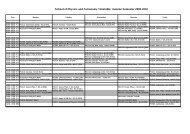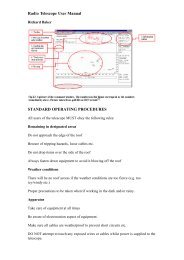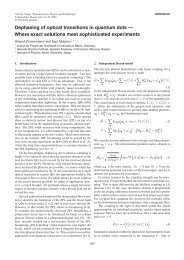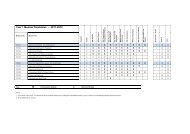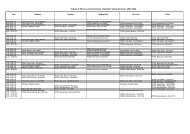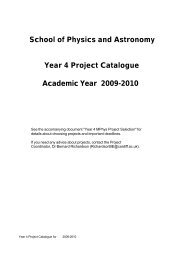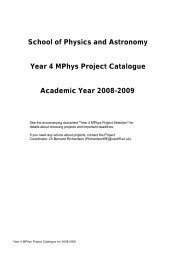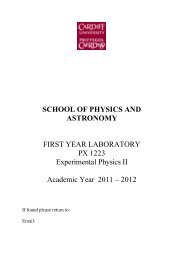PX1121 MECHANICS AND MATTER - Cardiff School of Physics and ...
PX1121 MECHANICS AND MATTER - Cardiff School of Physics and ...
PX1121 MECHANICS AND MATTER - Cardiff School of Physics and ...
Create successful ePaper yourself
Turn your PDF publications into a flip-book with our unique Google optimized e-Paper software.
PX1222 MATHEMATICAL METHODS FOR PHYSICISTS II<br />
MODULE INFORMATION:<br />
Spring semester: 10 credits.<br />
Module organiser: Dr E Pascale.<br />
Deputy Module Organiser: Pr<strong>of</strong> B S Sathyaprakash.<br />
Teaching <strong>and</strong> feedback methods: Lectures 22 x 1 hr, weekly exercise classes, marked exercises.<br />
Assessment: Examination 60%. Coursework 40%. [Examination duration: 2 hours]<br />
Pre-cursors: PX1122 (excepting joint Maths/<strong>Physics</strong> students).<br />
Co-requisites: None.<br />
Pre-requisites: None.<br />
AIMS OF THE MODULE:<br />
To provide the basic theoretical techniques required during first-year physics courses.<br />
To give post-A-Level students a solid grounding in complex numbers, vector calculus, second-order differential equations,<br />
matrices <strong>and</strong> basic probability theory.<br />
To give students practice in applying mathematical techniques to abstract <strong>and</strong> physical problems.<br />
LEARNING OUTCOMES:<br />
The student will be able to:<br />
Demonstrate pr<strong>of</strong>iciency at basic representations, operations <strong>and</strong> applications <strong>of</strong> complex numbers.<br />
Demonstrate an underst<strong>and</strong>ing <strong>of</strong> the meaning <strong>of</strong> scalar <strong>and</strong> vector fields, <strong>and</strong> demonstrate the application <strong>of</strong> grad, div,<br />
curl, Laplacian to the formulation <strong>of</strong> the laws <strong>of</strong> physics.<br />
Set up <strong>and</strong> solve simple first-order differential equations.<br />
Show pr<strong>of</strong>iciency in using techniques for solving first- <strong>and</strong> second-order differential equations.<br />
Show familiarity with basic probability distributions, statistical measures <strong>and</strong> their use.<br />
OUTLINE SYLLABUS:<br />
1. Arg<strong>and</strong> diagrams. Polar <strong>and</strong> Euler representations. De Moivre’s theorem. Complex functions. Physical applications <strong>of</strong><br />
complex numbers. Relationship to 2D vectors <strong>and</strong> matrices.<br />
2. Differentiation <strong>of</strong> a vector. Gradient vector. Conservative <strong>and</strong> non-conservative fields. Examples from physics.<br />
Differentiation <strong>of</strong> a function <strong>of</strong> more than one variable.<br />
3. Partial differentiation. Idea <strong>of</strong> div, grad <strong>and</strong> curl (briefly). Stationary values, maxima <strong>and</strong> minima. Conditional stationary<br />
values.<br />
4. Ordinary differential equations in physics. Setting up physical problems. General classification <strong>of</strong> ODEs. Superposition<br />
theorems. Boundary conditions<br />
5. Second-order linear homogeneous equations. Examples.<br />
6. Second-order linear inhomogeneous equations. Particular integrals <strong>and</strong> complementary functions. Trial solutions. Simple<br />
harmonic examples, use <strong>of</strong> .<br />
7. Introduction to Fourier series.<br />
8. Partial differential equations in physics. Examples (brief): Wave equation, heat equation, diffusion, Schrodinger equation.<br />
9. Separation <strong>of</strong> variables method <strong>of</strong> solving PDE.<br />
10. Probability Axioms. Discrete Events. Probability Distributions. Binomial <strong>and</strong> Poisson distributions.<br />
11. Normal distribution, r<strong>and</strong>om walks <strong>and</strong> diffusion. Means <strong>and</strong> variances. Relevance to statistical treatment <strong>of</strong> errors.<br />
TRANSFERABLE SKILLS:<br />
Problem solving. Investigative skills. Mathematics. Analytical skills.<br />
READING LIST:<br />
Modern Engineering Mathematics, G James (Addison Wesley).<br />
Mathematical Methods for <strong>Physics</strong> <strong>and</strong> Engineering, K F Riley, M P Hobson <strong>and</strong> S J Bence (Cambridge University Press).



